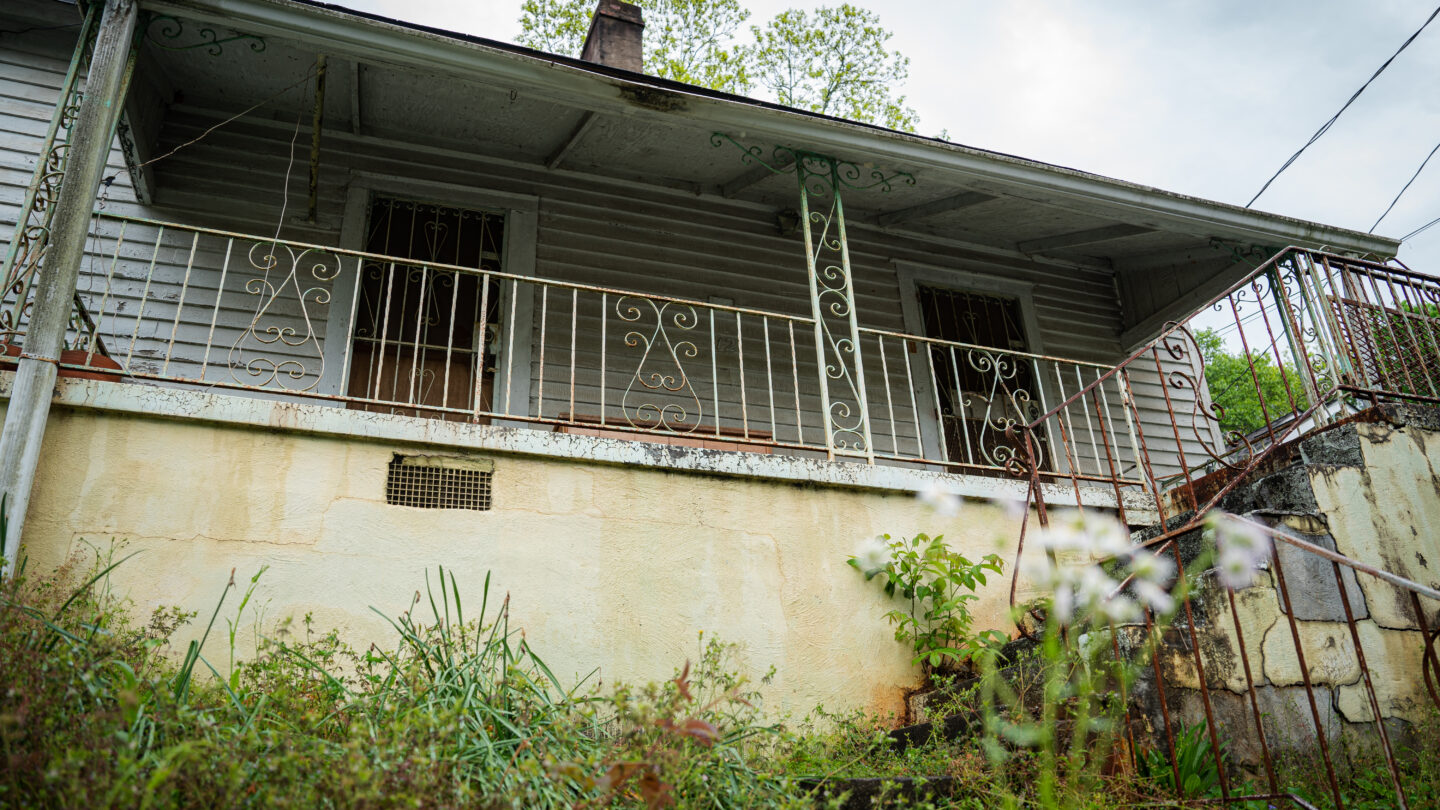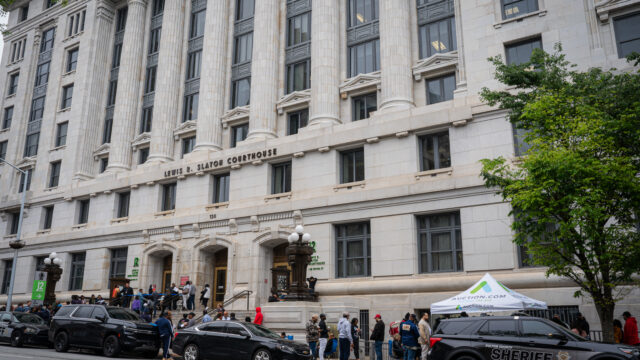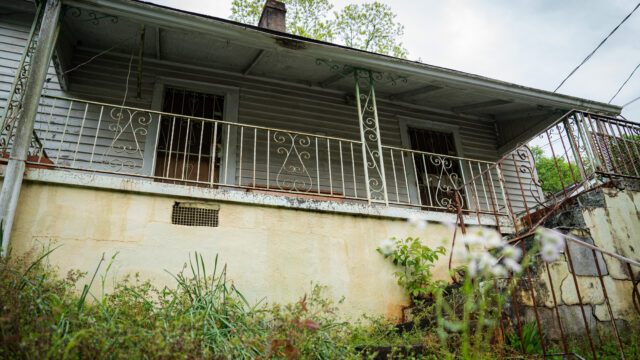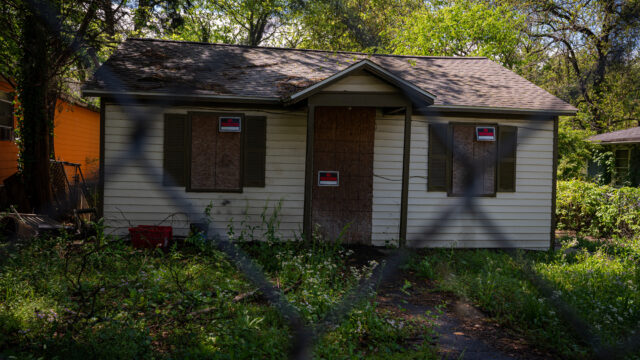Darrell Burford hasn’t been inside his childhood home, a midcentury modern off Cascade in Southwest Atlanta, since the eviction. His mom, in debt, had missed several property tax bills. When the Fulton County Marshal came, that was the final step.
“It was grab what you got,” Burford said. “Not one of the best days I’ve had to say the least.”
In South Atlanta, Adrianne Merideth couldn’t work because of a disability. But the state rejected her disability application. Having no income, she couldn’t maintain the shotgun home that had been in her family for a hundred years. The unpaid taxes sealed the property’s fate.
“It sucked then. It sucks now. I don’t need to wax poetic about it,” Merideth said.
April Rozier tried to preserve her family’s ranch home outside the perimeter in Southwest Atlanta. Her parents worked their way out of public housing to afford it. But after their death, the tax bill ballooned and Rozier couldn’t keep up. The experience soured her on her home county.
“I would never want to live in Fulton County again,” Rozier said.
Rozier, Merideth and Burford all lost their homes at the monthly property tax auction in Fulton County — something that, a WABE investigation found, affects Black homeowners more than anyone else.

Darrell Burford hasn’t been inside his childhood home since the Marshal came to evict he and his mom. (Matthew Pearson/WABE)
WABE analyzed the more than 3,200 properties auctioned for taxes between 2015 and 2022 in Fulton County. Eighty percent were in areas that for decades were mostly Black. That disparity held true even when limiting the properties to only those considered residential according to county land use policies.
While many of these auctioned parcels were vacant lots or forgotten properties of absentee investors, WABE also identified properties with longtime homeowners living in them.
As part one of this investigation explored, Fulton County is unlike, potentially, all other counties in Georgia because it outsources delinquent tax collection to investors. That gives the investors a unique level of control over the properties that go to the tax auction.
In this second part, WABE asked experts how counties can reduce the tax system’s burden on Black homeowners when tax commissioners play a more active role.

April Rozier wanted to maintain her family’s home. But after her parents died, the tax bill multiplied. (Matthew Pearson/WABE)
Local officials need ‘boots on the ground’
Georgetown Law Professor Dorothy Brown wrote about how U.S. tax policies disadvantage Black Americans in her book the “Whiteness of Wealth.” She said addressing inequities in property taxes and homeownership takes intention.
She said homeownership often doesn’t work out for Black families like it does for white ones.
“When you design a system to help Black Americans become homeowners and stay in their homes, you have to be cognizant of all the different ways this can go sideways,” she said.”
The reasons can range from families not setting up wills that identify their heirs to not knowing about property tax breaks, called homestead exemptions. Homeowners also may not have the savings to weather a challenge. WABE saw all of these problems in our reporting.
Kim Graziani, a senior advisor at the Center for Community Progress and an expert on tax enforcement, said they are issues that start much earlier than the auctions.
To prevent families from losing their homes, she said local officials have to be hands-on.
“A lot of it really has to do with just boots on the ground,” she said. “Really understanding, who in your community is impacted, who in your community is dealing with the financial hardship?”
Graziani has seen cities and counties figure out answers to these questions. She said Baltimore holds property tax clinics for homeowners who are behind. In San Antonio, advocates have gone door to door.
“There are a lot of bugs in the system that we need to work out, one of which is property taxes.”
Georgetown Law Professor Dorothy Brown
The tax treasurer for Cook County, which includes Chicago, reimagined her role. Maria Pappas hired researchers to look at inequities in the tax system. They’ve released studies showing the properties with the highest tax increases over the past 20 years and revealing how investors exploit a loophole in Illinois law.
To reach taxpayers, Pappas also goes on TV and the radio. In a semi-regular segment on WVON in Chicago, she asks people to call in to learn if they qualify for tax exemptions. When listeners learn of exemptions they haven’t claimed, local laws allow Pappas to send the homeowners refunds.
In a phone interview, Pappas said none of this is to help her collect taxes. She said the tax system is extremely complicated. Few residents understand it. This work tries to change that.
“So you know, it’s about educating people. It’s drip, drip, drip, drip, drip,” Pappas said. “And I’m drip drip, drip, drip, drip doing it.”

Darrell Burford’s former childhood home, off Cascade in Southwest Atlanta is now under renovation. It had been in his family around 40 years. (Matthew Pearson/WABE)
Recognizing the barriers to Black wealth
Without targeted efforts, the tax system often has the same unequal effect.
It goes beyond the tax auctions. Nationwide, research shows Black Americans pay higher property taxes than white Americans, even while appraisers are more likely to assign them with lower home values.
“When we talk about increasing the homeownership rate among Black Americans as a way to lessen the racial wealth gap, there are a lot of bugs in the system that we need to work out,” Brown said. “One of which is property taxes.”
Fulton Tax Commissioner Arthur Ferdinand did not accept WABE’s offer to discuss the county’s tax enforcement system in an interview. But his office’s practices affect more than the county. Under contracts, he also collects taxes for several cities, including Atlanta.
Most of the properties auctioned for taxes were within Atlanta city limits.
Atlanta Mayor Andre Dickens’ senior advisor for housing, Josh Humphries, said in a statement “the city is committed to preventing involuntary displacement of our legacy residents.” He said the city has invested $20 million in funding from a local bond program for critical home repairs.

With a disability and no income, Adrianne Merideth couldn’t afford to maintain her family’s home or pay the taxes. The home sold at the tax auction two years ago. (Matthew Pearson/WABE)
This year, the mayor also announced a $750,000 donation from producer and director Tyler Perry to pay off back taxes for low-income seniors and another $200 million donation to freeze property taxes for 100 seniors. Homeowners near the Atlanta BeltLine and in some westside neighborhoods may apply for property tax freezes through two privately funded programs too.
It’s worth noting that the Fulton tax commissioner already protects residents with senior homestead exemptions from the investors who buy tax debt and send properties to auction.
“Anything that is going to help protect Atlanta families needs to be the thing that we considered the most.”
City Council Member Jason Dozier
For that reason, the people who lose their homes are often those who either don’t know about the exemptions or don’t qualify under county policies. Advocates argue the county sometimes denies homeowners who should be eligible.
Tax freezes also may not solve the entire problem. In reviewing the stories behind more than 300 properties auctioned, WABE found many of these residents couldn’t pay because of a financial difficulty rather than a tax increase from rising values.
Given the data showing the auctions’ disproportionate impact on the city’s longtime Black neighborhoods, City Council member Jason Dozier, who chairs the Community Development and Human Services Committee, said the city should do more.
He said the city should ensure its tax collection policies meet homeowners where they are and don’t punish or, worse, push them from their homes.
“I think we need to look at all options on the table at the end of the day,” he said. “And anything that is going to help protect Atlanta families needs to be the thing that we considered the most.”












